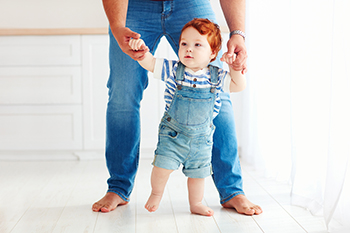
As babies and children explore their surroundings, falls are an inevitable part of their journey to independence. However, implementing precautionary measures can significantly reduce the risk of accidents and injuries. Start by creating a safe environment with secured gates at staircases and window guards to prevent falls from elevated surfaces. Ensure furniture is anchored to the wall to prevent tipping and keep floors clutter-free to minimize tripping hazards. When it comes to infants, always supervise them during diaper changes and avoid leaving them unattended on elevated surfaces such as changing tables or sofas. For toddlers and older children, teach them the importance of using handrails when climbing stairs and encourage safe play practices, such as not running indoors or jumping from high places. Additionally, provide age-appropriate toys and equipment and supervise them during activities such as climbing, swinging, or riding bikes. Many children’s feet can be affected from falling, which can hinder enjoying daily activities. If your child has fallen and has foot pain, it is suggested that you consult a podiatrist who can offer treatment solutions, and guide you on more effective fall prevention techniques for your children.
Preventing falls among the elderly is very important. If you are older and have fallen or fear that you are prone to falling, consult with Sarah Urton, DPM from Kitsilano Foot and Ankle Clinic. Our doctor will assess your condition and provide you with quality advice and care.
Every 11 seconds, an elderly American is being treated in an emergency room for a fall related injury. Falls are the leading cause of head and hip injuries for those 65 and older. Due to decreases in strength, balance, senses, and lack of awareness, elderly persons are very susceptible to falling. Thankfully, there are a number of things older persons can do to prevent falls.
How to Prevent Falls
Some effective methods that older persons can do to prevent falls include:
- Enrolling in strength and balance exercise program to increase balance and strength
- Periodically having your sight and hearing checked
- Discuss any medications you have with a doctor to see if it increases the risk of falling
- Clearing the house of falling hazards and installing devices like grab bars and railings
- Utilizing a walker or cane
- Wearing shoes that provide good support and cushioning
- Talking to family members about falling and increasing awareness
Falling can be a traumatic and embarrassing experience for elderly persons; this can make them less willing to leave the house, and less willing to talk to someone about their fears of falling. Doing such things, however, will increase the likelihood of tripping or losing one’s balance. Knowing the causes of falling and how to prevent them is the best way to mitigate the risk of serious injury.
If you have any questions, please feel free to contact our office located in Vancouver, BC . We offer the newest diagnostic and treatment technologies for all your foot care needs.
